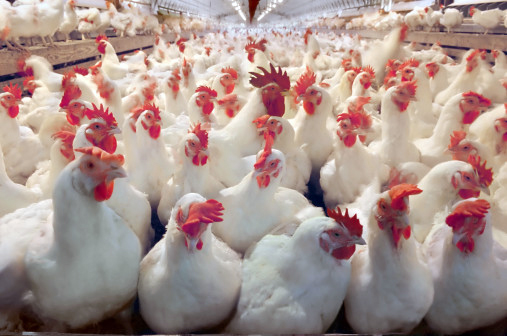Cairo – Domestically produced and imported poultry protein prices have spiked in Egypt in the last two weeks. Specialists and Egyptian businesspeople linked to the sector believe the hike was due to higher prices for feed inputs on the global market and Ukraine’s struggles to remain in international trade due to the war with Russia. Ukraine is a producer and exporter of poultry.
In the first week of Ramadan, the price of a kilo of chicken meat produced locally in Egypt reached EGP 40 (about USD 2.1 at the current rate). Prices for poultry imported from Brazil and Ukraine ranged between EGP 65 and 70 (about USD 3.5 to 3.8).
A large part of Egypt’s population is Muslim and has been living the religious period of Ramadan since the beginning of April, in which the Islamic fast during the day and have meals after sunset. This particular period lasts for a month – this year, until the beginning of May – and usually increases the demand for food in Islamic countries. Ramadan ends with a grand festive celebration.
Generally, the first week of Ramadan boosts demand for food products in Egypt, such as poultry and beef, increasing around 25% compared to the rest of the year. In 2022, however, a drop in protein consumption has been registered due to soaring prices and diminishing consumer purchasing power.
Khalifa: Prices reached unprecedented level

The vice-chair of the Board of Directors of the Swailem Group, Manal Khalifa, said since mid-March, poultry protein prices have been reaching never-before-seen increases, between USD 800 and 1,000 a tonne.
In an exclusive interview with ANBA, she stated the price of Brazilian frozen poultry in Egypt is close to USD 3,000 a tonne before import tariffs, which increased the sales price in the local market for the Egyptian consumer. She believes the surge is due to the drop in Ukraine’s exports, which made countries look for alternatives like Brazil to compensate for the deficit in global supply. Khalifa mentioned Saudi Arabia as one of the countries that supplanted imports from Ukraine with purchases from Brazil.
The businesswoman claims the growth in demand for poultry in the last week of Shaban – the period leading up to Ramadan – and in the first week of Ramadan revealed a supply shortage, requiring the need to waive tariffs on imports, estimated at 30%, to facilitate imports, improve the supply of poultry protein to the Egyptian market and control prices.
El-Sayed: Fodder cultivation could be expanded
The head of the Poultry Division at the Cairo Chamber of Commerce, Abdel Aziz El-Sayed, sees the current crises, with heightened prices in transport, logistics, oil, and production of raw inputs, as reasons for the global price hike. According to him, the price for a tonne of fodder used on Egyptian poultry farms has risen from EGP 8,000 (about USD 435) to EGP 11,000 (USD 598), and these inputs could be produced locally. Compared to last year, prices have doubled, according to him.

According to Sayed, Egypt buys 80% of the fodder for poultry abroad and produces only 20% domestically. He believes local supply could account for 80% or even self-sufficiency. The head of the Poultry Division envisions national production could increase with more productivity, supplying of seeds, and meetings with farmers to learn about their perspectives and demands. According to him, the demand for Egyptian poultry fodder is 12 million tonnes a year.
Sayed sees a 50% decrease in poultry purchases in the first week of Ramadan compared to last year’s same period. Increased prices made citizens reduce purchases and rationalize consumption, according to him. Still, the executive believes the avert to buy will not affect the price, as the spike in poultry protein prices is linked to feed supply.
Although the measure has been taken to secure supply, the head of the Poultry Division at the Cairo Chamber of Commerce said the waiver of tariffs on poultry imports could hamper local production and lead to the closure of national projects.
Al-Zeini: Egyptian self-sufficiency
The vice-chair of the Al-Assad Fodder Management Board, Tharwat Al-Zeini, said the upsurge in fodder and shipping prices is the reason for the spike in poultry and egg prices, especially as Egypt is experiencing an exceptional period of shortage of imported inputs, in addition to a significant surge in input prices in the local market.

Al-Zeini said in an exclusive interview with ANBA that poultry production is not in crisis, but the price hike is related to shipping and global purchasing power. According to him, the month of Ramadan was always considered a time of high sales for poultry, as they usually grow 50% in comparison to the other months of the year. Al-Zeini added the continuing war between Ukraine and Russia could result in maize shortages and worsen the crisis. Maize is one of the bases of animal feed.
The vice-chair also foresees a significant drop in demand for poultry due to the inflated prices, as wages in Egypt have not been raised. However, he understands an increase in demand would also cause costs to heighten. Al-Zeini said Egypt had achieved self-sufficiency in poultry protein and eggs and, therefore, does not need to purchase the product abroad and waive import tariffs to control prices.
Translated by Elúsio Brasileiro




